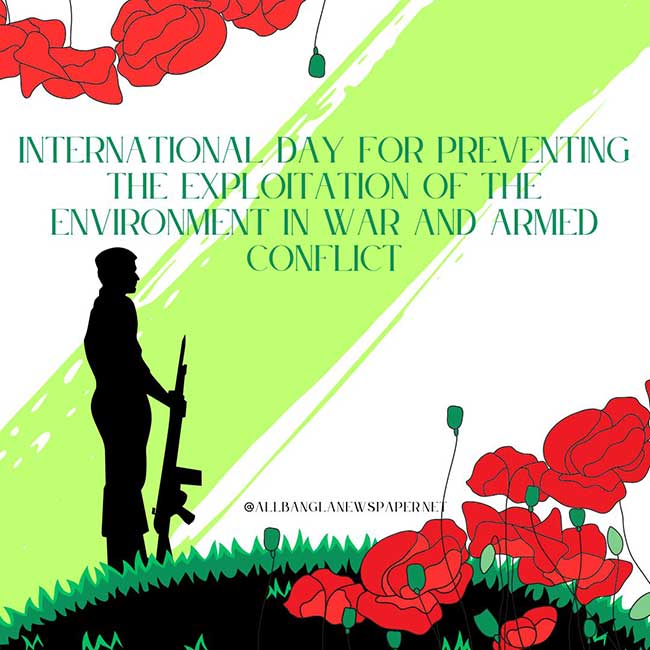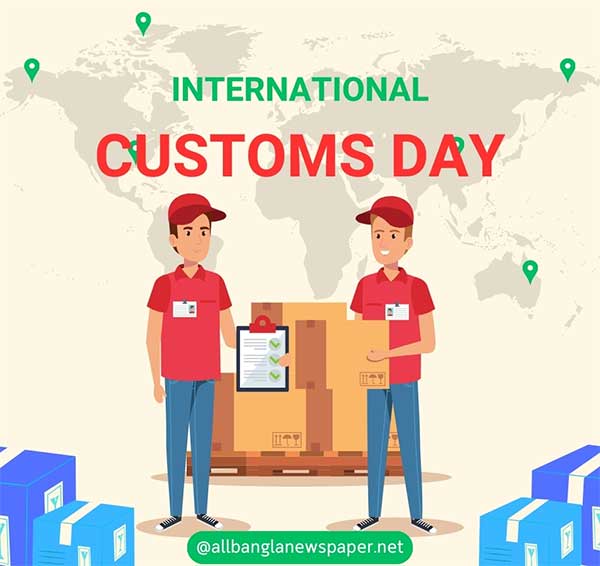
Each year on November 6th, the world observes the International Day for Preventing the Exploitation of the Environment in War and Armed Conflict, a day dedicated to raising awareness about the impact of armed conflicts on our planet. Armed conflicts do more than disrupt societies—they devastate the natural environment, often with lasting and severe consequences. This day calls on global leaders, communities, and individuals to recognize the urgency of protecting nature, even amid warfare, for current and future generations.

What is the International Day for Preventing the Exploitation of the Environment in War and Armed Conflict?
This observance, organized by the United Nations, highlights the pressing need to protect the environment from the destructive impacts of war. Often overlooked in the chaos of conflict, natural resources like water, land, and forests face exploitation, polluting the environment and harming ecosystems that may take decades to recover. By focusing on this issue, the UN hopes to mobilize global efforts toward sustainable conflict management and ecological preservation.
The History and Significance of the Day
The United Nations General Assembly established this observance in 2001. Recognizing the damage war inflicts on ecosystems, the day aims to remind the world that natural resources, like human lives, deserve protection and respect. As global populations increase and environmental resources become scarcer, the importance of this day grows, underscoring the necessity for policies that protect the environment even in times of conflict.
Why is Environmental Protection Important During Conflicts?
Conflicts disrupt societies and economies, resulting in environmental degradation that can outlast the conflict. Protected lands, water sources, and air quality are crucial for human and ecological health. Environmental damage impacts agriculture, biodiversity, and water resources, essential for human survival and well-being. In post-conflict recovery, restoring environmental resources is as vital as rebuilding infrastructure.
Impacts of War on the Environment
When a war erupts, land is destroyed by bombs, forests are stripped of resources, and chemicals and waste pollute waterways. Damage from such activities can persist for decades, affecting everything from food security to public health. During conflicts, habitats are often destroyed, leading to biodiversity loss, including endangered species.
Effects of Environmental Damage on Local Communities
Environmental destruction adds to the struggles of communities living in conflict zones, contaminating water sources and reducing agricultural productivity. Poor air quality, polluted soil, and inadequate water further stress these communities' health. As ecosystems are damaged, local communities bear the brunt of environmental degradation, facing immediate and long-term health and economic hardships.
Examples of Environmental Exploitation in Conflicts
Vietnam War and Agent Orange
During the Vietnam War, the herbicide Agent Orange was used to defoliate forests. This devastated the landscape and left a toxic legacy, affecting the environment's health and local communities today.
Gulf War Oil Fires
In the Gulf War, retreating forces set oil fields ablaze, leading to massive air pollution and environmental destruction. The smoke and soot from these fires affected air quality and local ecosystems across the region, creating long-lasting ecological issues.
Environmental Exploitation in Modern Conflicts
Modern conflicts continue to exploit the environment. Oil resources are targeted, forests are clear-cut for strategic purposes, and water supplies are contaminated, demonstrating that environmental exploitation remains a tool of warfare today. This exploitation destabilizes ecosystems and local communities, pushing the need for stricter ecological protections in war zones.
Role of the United Nations and Global Bodies
The United Nations Environment Programme (UNEP) and other global organizations are critical in protecting the environment. These bodies monitor and report on environmental abuses, advocate for policy changes, and work with governments to ensure compliance with international laws designed to protect natural resources.
How International Laws Aim to Protect the Environment in War
International laws, such as the Geneva Conventions and various environmental treaties, are designed to prevent ecological destruction during armed conflicts. These laws hold parties accountable and ensure natural resources are respected and preserved. Strengthening these laws and enforcing them consistently are essential for lasting environmental protection.
The Importance of Environmental Justice and Accountability
Environmental justice involves holding those responsible for environmental degradation accountable for their actions. This justice is essential to ensure that those harmed by environmental exploitation receive reparations. Accountability is critical in discouraging future violations and protecting natural resources for the benefit of all.
The Role of Media and Journalism
Media plays a crucial role in documenting environmental exploitation during conflicts. Journalists risk their lives to report on ecological abuse and advocate for justice. Recognizing the importance of journalism in this context, the International Day to End Impunity for Crimes Against Journalists—Honoring Press Freedom and Protecting Voices highlights the need to safeguard journalists who expose environmental crimes, reinforcing their essential role in upholding truth and justice.
How Individuals and Organizations Can Help
Organizations and individuals can contribute to preventing environmental exploitation in conflicts by supporting policies that promote environmental protection and holding responsible parties accountable. Ecological and human rights organizations worldwide advocate for these causes, and individuals can help by raising awareness, supporting ecological nonprofits, and staying informed.
The Future of Environmental Protection in Conflict Zones
With the growing impact of climate change and resource scarcity, the need for environmental protection in conflict zones is more urgent than ever. Continued international collaboration, policy development, and law enforcement are vital to ensure a sustainable future where human rights and environmental health are preserved.
Conclusion
The International Day for Preventing the Exploitation of the Environment in War and Armed Conflict reminds us of the devastating impact conflicts have on the planet. Recognizing this impact, working to strengthen protections, and holding accountable those who harm the environment in conflict is essential for a sustainable future. Environmental preservation during a war is a challenge, but with continued efforts and global support, we can safeguard our planet and its natural resources for future generations.
FAQs
1. What is the International Day for Preventing the Exploitation of the Environment in War and Armed Conflict?
This day, November 6th, is observed to raise awareness about protecting the environment from exploitation during wars and armed conflicts.
2. How does war impact the environment?
War damages ecosystems contaminates water sources, pollutes the air, and depletes natural resources, often leaving long-lasting effects on the environment.
3. What role does the UN play in preventing environmental exploitation?
The UN monitors, reports on, and advocates for policies that protect the environment during conflicts, working with governments to ensure compliance with international laws.
4. How can international laws protect the environment during conflicts?
International laws, like the Geneva Conventions, include provisions that protect natural resources, holding violators accountable for environmental destruction.
5. What can individuals do to support environmental protection during conflicts?
Individuals can raise awareness, support environmental organizations, and advocate for policies that prevent environmental exploitation in conflict zones.
6. How does journalism help in addressing environmental exploitation in wars?
Journalists document environmental abuses, raise public awareness, and advocate for accountability, playing a vital role in exposing and combating exploitation.
#InternationalDayForPreventingTheExploitationOfTheEnvironmentInWarAndArmedConflict #EnvironmentalProtection #WarAndEnvironment



